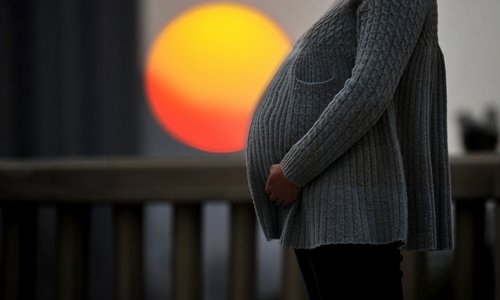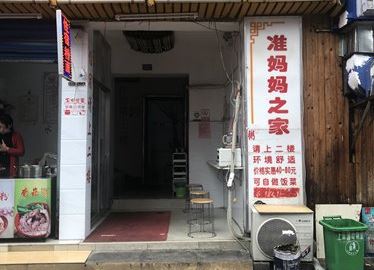
From the People's Daily app.
And this is Story in the Story.
China's second-child policy is driving a surge in demand for fertility treatment among older women.
“More and more women are coming to ask to have their second child,” said Dr Liu Jiaen, who runs a private hospital in Beijing treating infertility through IVF, in which an egg and sperm are combined in a laboratory dish and the resulting embryo transferred to a woman's uterus.
Before, the average age of Liu's patients was about 35. Now most of them were older than 40 and some of the women were fast approaching 50, Liu said.
Modern assisted reproductive technology has also made the process much less painful for women seeking to have another baby.
Today's story in the story looks at the rush of older parents hoping to conceive through fertility treatment after China's one-child policy relaxed.

A profile of a pregnant woman in East China's Shandong Province. (Photo: IC)
Medical terms such as zygote, oestrogen, and ovulation can often be heard among the residents of Shangmayuanling community, which is located next to two renowned in-vitro fertilization (IVF) treatment hospitals, Xiangya Hospital Central South University, and the Reproductive & Genetic Hospital of CITIC Xiangya, of Changsha, Central China's Hunan Province, the leading fertility center in China.
Hundreds of home inns can be seen deep in the Shangmayuanling community. Couples from all over the country hoping to conceive via IVF in the two hospitals choose to lodge here, as it can cost as cheap as 30 yuan a day.
Cheng Yujuan, 35, and her husband live in a 10-square-meter remodeled chamber on the top floor of a four-story old building.
Cheng and her husband are both farmers from a remote village in Southwest China's Yunnan Province. They had been planning to have another child since their son was 5 years old after China adopted the second-child policy in 2016. However, all the attempts failed, with Cheng suffering several miscarriages due to an oviduct problem.
"We want to give our son a sibling, a pal in his childhood, and when they grow up they can support each other." Cheng explained.
Before coming to Changsha, Cheng and her husband had gone through three rounds of IVF at the local hospital, which had cost them all their savings, as one round of IVF costs between 30,000 and 40,000 yuan.
Liu Minxia, 56, has been running the home inn with her husband for 13 years. Liu solicits customers at an intersection between the two hospitals every day with her peers, and her husband is in charge of the reception work.
"They come and stay for a week or two for examination and ovulation induction medicine, and come back after a period of time for another round of examination and egg retrieval," Liu said.
Liu and her husband also give tips to newcomers on how to register from a smartphone app, and care about their treatment process.

The doorway to a home inn named "Home for Mothers-to-be" near two leading IVF treatment hospitals in Changsha, Central China's Hunan Province. (Photo: GT)
Li Yanping, director of the reproductive medicine center at Xiangya Hospital Central South University, said that women older than 35 tend to have lower fertility due to the recession of their physiological functions. Additionally, negative emotions and pressure of slipping from their prime childbearing years can also have an effect on pregnancy.
"In addition to the above-mentioned reasons, the decreasing quality and quantity of the ovum is a reason for the high miscarriage rate among pregnant women older than 35, which in turn brings greater mental stress and leads to a higher miscarriage rate," said Li.
In the past 30 years, assisted reproductive technology has seen significant development in China, as it is much less painful and also increases the fertility rate.
Li Qinghua, 37, gave birth to a son five years ago after undergoing IVF at the reproductive medicine center. She was told the process would be painful, and didn't expect the current technology to make it much easier than before.
Now she is planning to have another child with the embryos she had frozen five years ago. "Now that the policy allows us to have two children, and society is in a time of prosperity, we are confident in the future," Li Qinghua added.
Remarkable progress has also been made in terms of laboratory research. Sperm quality was another factor that influences the success rate.
Endometrial disease is another major issue in the reproductive sector. "Many women who undergo IVF therapy suffer from endometrium damage due to multiple abortions," said Li Yanping.
(Produced by Nancy Yan Xu, Da Hang, Lance Crayon, Brian Lowe and Chelle Wenqian Zeng. Music by: bensound.com. Text from Global Times.)


